Exiled from South Africa - 30 years ago - February 14, 1987
30 years ago today I arrived in London as an exile from my homeland, South Africa. I was an exile - not a refugee.
I came home from work one day late in 1986 and told my wife that I had booked a ticket to leave South Africa on February 13, 1987 - just a few months ahead.
What did I know then?
I had completed the full time part of my compulsory military service in 1974/75. I had completed a number of the compulsory training camps - we had to do 720 days of service in the 10 years after National Service. The rotation was 30 days one year and 90 days the next year. I had deferred a number of those camps by completing further education - the requirement was education had to lead to qualification and had to involve lectures. I had qualified as an accountant and was completing my thesis for an MBA. These were my choices
- Do the military service. My problem was military service role was being changed from doing border duties to doing township duties. I was not prepared to do that. I also noticed that my colleagues who did do the service were being held back in career progression.
- Continue studying and seek further deferment of training camps. I felt that I had done enough studying. I also felt that there was no prospect of a change in government policy any time soon.
- Refuse to do the military service and stay around to protest for a new future. My friend, Peter refused military service. He was convicted and sentenced to 4 years in prison. He was paroled after 3 years and was called up directly after release. He was sentenced to another 4 years with no option for parole. He would spend 7 years in prison before he was 30 - not your standard prison incumbent.
- Leave. I had a passport and I had been interviewed in the first round by a leading world management consulting firm and had the prospects of getting to second round in London. That is what I chose.
What was South Africa all about in 1986?
It was clear to me that ever since the 1976 Soweto Riots that there was no turning back.
I had lived through the riots in Cape Town during 1978. I had been on campus when the South African Police Force came onto campus to break up demonstrations (the first time that had happened). I was working as a Graduate Assistant during the student boycotts of 1980. I was forced to appear for work each day during the boycotts. I had no shortage of friends that were involved in the South African Border war on the South West African-Angolan border. I served there in 1975 not long before the invasion of Angola.

Photo Copyright of the Outapi War Museum.
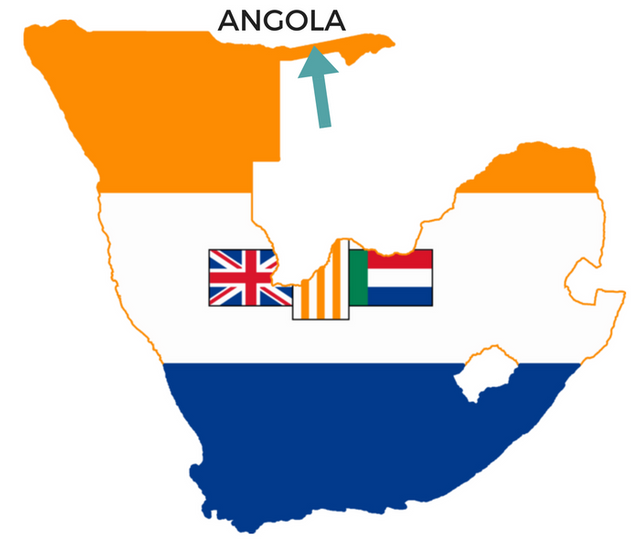
This was my world
I watched as the Prime Minster PW Botha took powers as State President. This was not the most constitutional thing a lawyer trained in Constitutional Law should have to watch. I sat through the very famous "cross the Rubicon" speech by PW Botha which indicated that he was going to drive a hard journey forward to subdue the revolution. I could not see a way out of this.
![]()
http://www.radiofreesouthafrica.com/pw-botha-failed-cross-rubicon-30-years-ago-sas-great-cost/
And I watched as police powers grew and the brutality of the suppression unfolded in front of our eyes
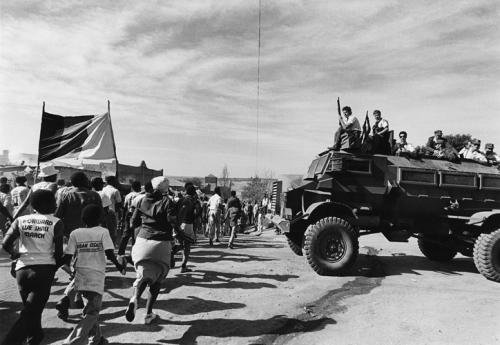
Police watch mourners, Alexandra township, Johannesburg, 1986
Copyright UCT Library Services http://www.digitalcollections.lib.uct.ac.za/islandora/object/islandora%3A898
I booked the tickets. Within a few days my call up papers arrived for 3 months service in Soweto Township outside Johannesburg - coincidentally for February 14, 1987. There was one small technical thing I had to complete. Because I was leaving South Africa on a British Passport, I had to get permission to leave - called a Return Visa. I went to the Department of Home Affairs in Johannesburg and was interviewed by a very officious gentleman named Mr Viljoen . Conversation went something like this. Imagine a very thick South African accent from mustachioed Mr Viljoen - he was a very short man:
"You know Mr Carrington, I can tear up your passport any day of the week"
"I know that Mr Viljoen, and I can go to the British Embassy in Pretoria and get a new one every day of the week"
He signed the form and I was gone. I do not really know what I would have done if he had not - walk across a border was the best I could think of. That would have made me a refugee.
Those bold decisions were life changing. I did not imagine in 1986 or even on February 13, 1987 where this journey was going to take me. I did not even know how cold I was going to feel when I went for a walk along the River Thames this day 30 years ago on a crisp winter's day. I was freezing but I was free. I was not looking that far ahead.
All I knew was I had the right to live in England, I had a solid university and professional education and I had £1500 in cash - it was gone in 6 weeks. I had no job but I did have two job interviews and a place to live rent free until I got a job. And I knew 4 people in London - Patrick had been the best man at my wedding and I was able to live with him. Nicholas and Paul had worked with me in Johannesburg and David had interviewed me in the first round in Johannesburg. I also have family living in England and I had met 3 of them, my aunt Jessie, my cousins Peter and Janet. For the rest I was on my own facing a world of total uncertainty. All I knew is I had capability and 6 years working experience as a management consultant and time on my side.
What I could not have known*
I did get that job with McKinsey & Co in London and started work in 74 St James Street on March 23, 1987 - just shy of 6 weeks later. 6 months before, I did not even know what McKinsey & Co, the world's leading top management consultancy, was.

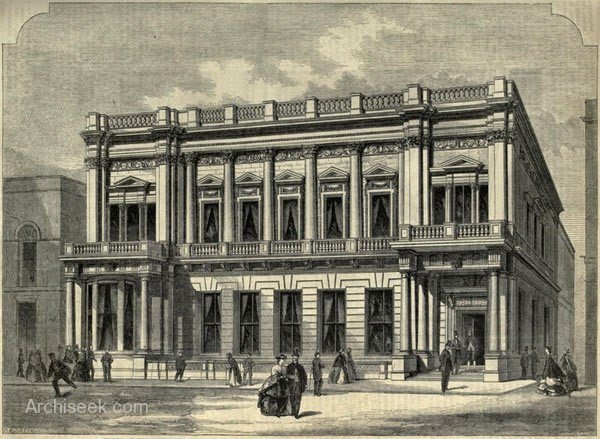
http://onelondonone.blogspot.com.au/2016/05/loose-in-london-open-house-weekend-74.html
My wife sold the Johannesburg house. She returned my military gear to my unit.
"This is my husband's gear", she says.
"Where is he?" says the Quartermaster.
"Gone" she says.
"Where?"
"Gone" says she shrugging.
She joined me in May 1987 with her £1,500, a car and a container of furniture. Time to build again. As I look back I cannot believe that I would work in 15 different countries across the world, father 3 wonderful children, start my own consulting business and sell it, find a way of moving to Australia as part of an early retirement plan. Those stories are for other days.
There are a bunch of other things I cannot have known. The South African Government started secret discussions with the ANC in 1986. Those discussions led to the release of Nelson Mandela in 1992 and the election of a new government in 1994. My homeland too completed its exile and became free. And in 1997, I was able to go back to my homeland and open an office for my new consulting firm and to run project work there. In that way I was able to start giving back to the country that had given me my start and that had found its path to freedom.
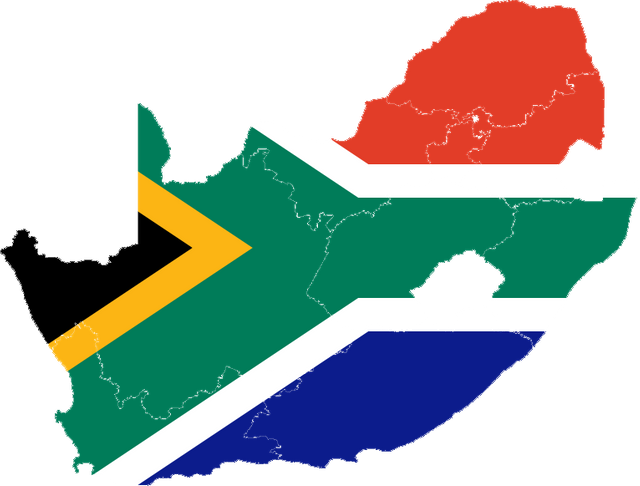
I went walking around my new home yesterday. I could not have known that I would spend my 30th anniversary meeting up with a McKinsey colleague, Simon, who I met in 1989, who married a South African lady and who would be working in the new buildings in Barangaroo, Sydney with this view of the Anzac Bridge.
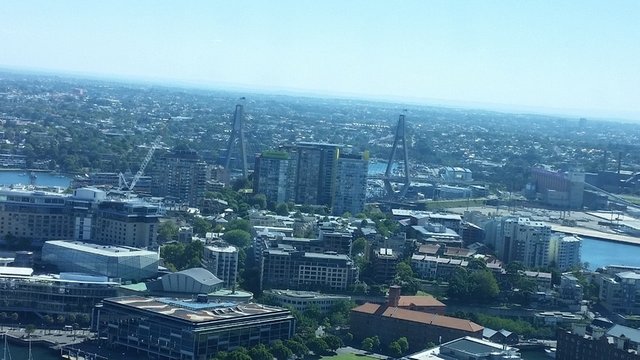
Credits
Old South African flag on the map:
https://commons.wikimedia.org By DrRandomFactor (Own work) [CC BY-SA 3.0 (http://creativecommons.org/licenses/by-sa/3.0)], via Wikimedia Commons. Can be adapted.
New South African Flag
https://commons.wikimedia.org By Flag_of_South_Africa.svg: South Africa Goverment South_Africa_blank_map.svg: *South_Africa_blank.svg: Mangwanani derivative work: Clapsus (talk) derivative work: Shooke (Talk me in spanish, english or italian) 22:04, 10 March 2010 (UTC) [CC BY-SA 3.0 (http://creativecommons.org/licenses/by-sa/3.0)], via Wikimedia Commons
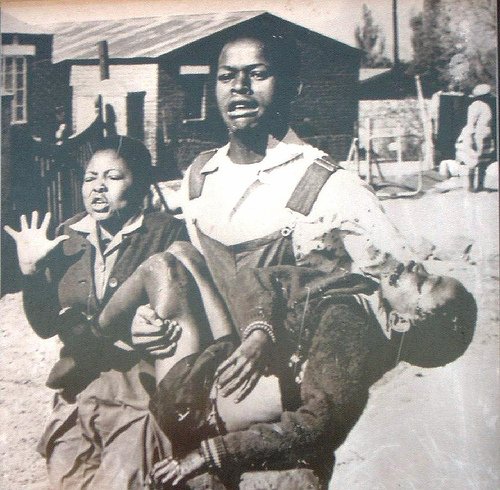
A great reflection over the years, the pain and suffering, on going conflict for all living in our wonderful land both before and after 1994. With politics, no one is ever a winner, many young lives lost, many still carrying the scars. The walk is always a lonely one, leaving families split and spread across the world.
The family split felt quite normal. My parents emigrated to South Africa from England after World War II. I only ever got to know one grandfather, one aunt and one cousin. All the rest were on the other side of the world when I was growing up. So for me to move across to England and leave my family behind was not really a factor in making the choice. The first 5 years that I could not visit my parents was tough though.
I grew up with immediate family only as my parents too were immigrants. My grandfather visited South Africa quite a few times. I did meet my grandmother but I do not recall very much (I was 4) and she died while we were visiting. My aunt and her son visited once. For the rest my family were strangers.
Moving away from family was not really hard. I went to boarding school the same year my brother went to sea. I went away for military service and during that time my brother went to Canada. I went away for university - so basically I did not live with my family from the time I was 12.
I guess my family feels a bit like that too - 2 siblings live in England and only one is left in Johannesburg, where my mother still lives. I have not seen any of them for close on 4 years now.
That is the way those circles of life have turned.
Incredible story
Fantastic story, following you now!
Thanks and followed you too.
Interesting life and times indeed sir. I've had the pleasure of seeing the anzac bridge in person, Sydney is wonderful.
Thanks. First time in the (new) building gave me the unique angle - not often does one see a photo of Anzac bridge posted. It is all about the Harbour Bridge.
Thank you for sharing your journey.